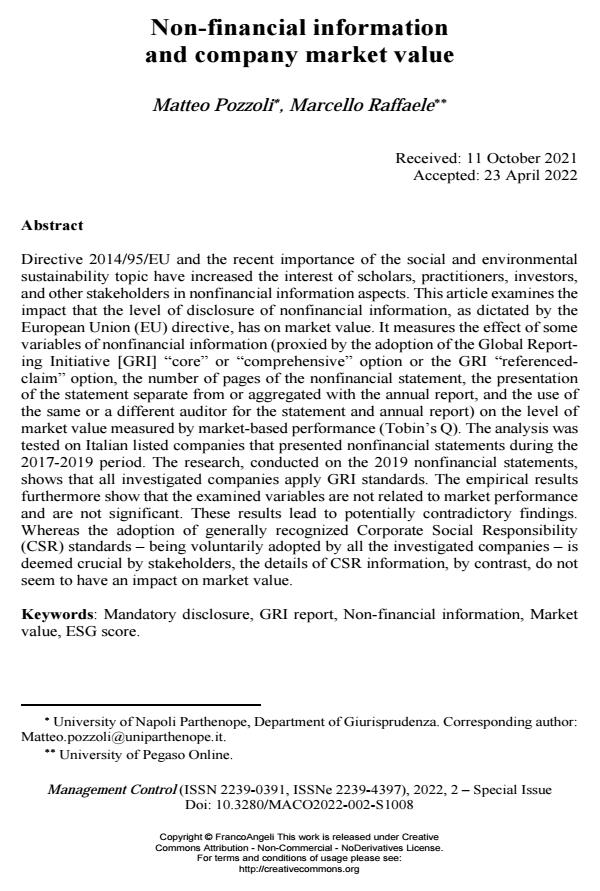Non-financial information and company market value
Titolo Rivista MANAGEMENT CONTROL
Autori/Curatori Matteo Pozzoli, Marcello Raffaele
Anno di pubblicazione 2022 Fascicolo 2022/2 Suppl.
Lingua Inglese Numero pagine 21 P. 167-187 Dimensione file 306 KB
DOI 10.3280/MACO2022-002-S1008
Il DOI è il codice a barre della proprietà intellettuale: per saperne di più
clicca qui

FrancoAngeli è membro della Publishers International Linking Association, Inc (PILA), associazione indipendente e non profit per facilitare (attraverso i servizi tecnologici implementati da CrossRef.org) l’accesso degli studiosi ai contenuti digitali nelle pubblicazioni professionali e scientifiche.
Directive 2014/95/EU and the recent importance of the social and environmental sustainability topic have increased the interest of scholars, practitioners, investors, and other stakeholders in nonfinancial information aspects. This article examines the impact that the level of disclosure of nonfinancial information, as dictated by the European Union (EU) directive, has on market value. It measures the effect of some variables of nonfinancial information (proxied by the adoption of the Glob-al Reporting Initiative [GRI] "core" or "comprehensive" option or the GRI "refer-enced-claim" option, the number of pages of the nonfinancial statement, the presentation of the statement separate from or aggregated with the annual report, and the use of the same or a different auditor for the statement and annual report) on the level of market value measured by market-based performance (Tobin’s Q). The analysis was tested on Italian listed companies that presented nonfinancial statements during the 2017-2019 period. The research, conducted on the 2019 nonfinancial statements, shows that all investigated companies apply GRI stand-ards. The empirical results furthermore show that the examined variables are not related to market performance and are not significant. These results lead to poten-tially contradictory findings. Whereas the adoption of generally recognized Corpo-rate Social Responsibility (CSR) standards - being voluntarily adopted by all the investigated companies - is deemed crucial by stakeholders, the details of CSR information, by contrast, do not seem to have an impact on market value.
Parole chiave:Mandatory disclosure, GRI report, Non-financial information, Market value, ESG score.
- Integrating ESG issue into performance management system: An analysis of Italian Context Salvatore Principale, Daniela Cicchini, Luigi Andrea Carello, Rubina Michela Galeotti, in MANAGEMENT CONTROL 2/2024 pp.15
DOI: 10.3280/MACO2024-002002
Matteo Pozzoli, Marcello Raffaele, Non-financial information and company market value in "MANAGEMENT CONTROL" 2 Suppl./2022, pp 167-187, DOI: 10.3280/MACO2022-002-S1008